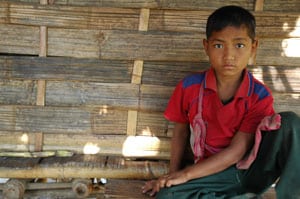Ten-year-old Suppakit walks in the oppressive 100-degree heat along a narrow dirt path. His feet are cut up and blistered from frequently journeying on this path. Every day he travels on this trail just to get water from the Sop Moei River. He has to constantly be on guard and aware of his surroundings. The closer he gets to the river, the closer he is to his former home town in Myanmar, the place where his family fled.
Suppakit and his family are a part of the Karen tribal group, which is a minority group in Myanmar. This group faces extremely difficult circumstances, and his family eventually fled to Thailand. Now Suppakit’s family is recognized as a refugee family with limited rights in Thailand.
“During the winter it is very cold here, and I have only a small, thin blanket to cover myself. Sometimes when it gets unbearably cold, I give my blanket to my little brother to keep him warm, and I make a fire and sit around it to get warm instead.”
The bamboo house is divided into two parts, a balcony and a bedroom. The house is no larger than 169 square feet. At night, the entire family, consisting of eight members, sleeps together on one old, thin fabric with torn pillows. Every night Supakit hangs an old, torn mosquito net over his mattress. There is no electricity. He uses a candle as a light during the night.
Suppakit bathes in the river because there is no bathroom in the house. It lacks running water. The only water source is the river. It is Supakit’s responsibility to carry water from the river to his home for the family’s daily use.
The typical meal for Suppakit’s family is rice, boiled vegetables and chili paste. They hardly ever get the chance to eat meat because it is a luxury they can rarely afford.
One evening Suppakit’s father, the family’s only breadwinner, was seriously injured when he stepped on a land mine near the border while collecting vegetables for the family. He lost one of his legs.
Soon after, Suppakit’s mother was diagnosed with cancer. She was admitted to the hospital in the local refugee camp. Suppakit did not see his parents for two years because his father left to take care of his sick wife at the hospital. While his parents were gone, Suppakit stayed with his grandparents.
Suppakit could not go to the refugee hospital because he did not have enough money, and being a refugee with no legal rights, he was afraid the soldiers would seize him if he traveled outside of his village of Nong Bua. Nong Bua is located in a very remote area, and is about an eight-hour drive from the city of Tak.
In Nong Bua village, many refugees are in the same situation as Suppakit. But in this small village, a church is dedicated to helping these families.
Most of the Karen refugees in Nong Bua are from a Buddhist background. They also have strong animist beliefs. They have a village headman who says he communicates with the natural and ancestral spirits on their behalf.
“In Nong Bua village, more than 70 percent of the villagers are refugees [from Myanmar]. The Sob Moei River divides the two countries. However, the distance isn’t great as it takes only five minutes to reach one country to the other. Most of the villagers are illiterate and they are living in very poor conditions. We want to do something to help them to have a better life,” explains Sudthida, a staff member at Nong Bua Church Child Development Center.
A few months after the child development center opened, Suppakit’s father took his son to the church and asked the staff to accept his son into the sponsorship program because he wanted his son to receive the help, guidance and education that he was unable to provide.
Nared Charoensriwanit, a Partnership Facilitator who works with the church, says,
“The church has plans to help refugee families like Suppakit in two ways. In the short term, the church provides them basic needs, such as food and necessary items that they use daily. Besides that, the center supports the infrastructure for building a house and distributes tools like knives, spades or shovels that are used in farmland.
“For the long term, the church will support and give knowledge to children on educational and vocational skills. We will emphasize agriculture, such as feeding domestic animals or growing crops.”
Sopa Marturongsa-nguan, the center director, adds,
“We hope to see those refugee children applying the knowledge and skills that they have learned to earn income when they grow up. We will teach them languages such as Burmese, Karen, Thai and English. As they live along the border, the language will be very useful to them to make a living.”
On week days, Suppakit attends a school near his village. The quality of education in remote areas is quite poor. The students in the classroom greatly outnumber the one teacher assigned to teach them. Also, the school lacks resources and materials.
In contrast to his life at school, at the development center Suppakit receives one-on-one attention from staff members and he gains much useful knowledge, encouragement and inspiration.

